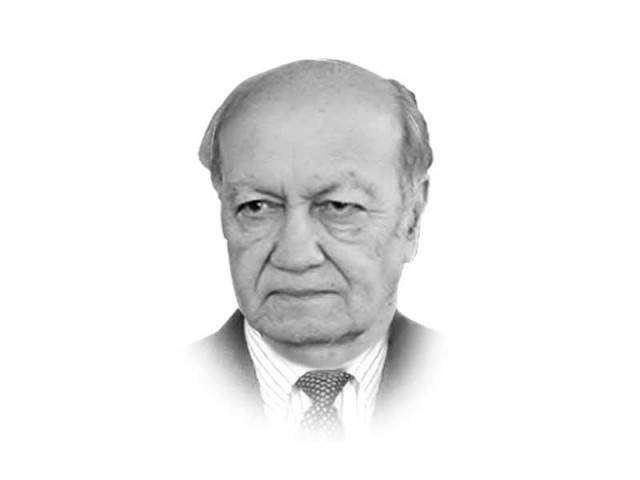The neglect of education
Education alone will not reverse our continued decline into chaos and stupor, but surely, it will play a major role.

The writer is a retired lieutenant general of the Pakistan Army and served as chairman of the Pakistan Ordnance Factories Board
But there is something far more important and more fundamental that the leadership of this country, whether it is the Sharifs, Zardaris, or for that matter the previous military and civilian rulers, have grossly neglected and continue to do so, which is education. It is time that our leaders, at every level, invest heavily in education and treat it as a number one priority. Most of the problems that Pakistan faces today — militancy, a distressed economy, poverty and poor health can be linked to lack of education.
There is a virtual global consensus that education is the key to development. The answer may appear to be self-evident but it is not merely a question of just spreading knowledge and some skills or being able to read and write. Access to education is the key to empowerment, self-confidence and dignity of the individual. It is this empowerment that gives the underprivileged the courage to bring down class barriers. It is education, which propelled Barack Obama and Bill Clinton to rise to the pinnacle of power although they were from humble backgrounds. In Pakistan, too, we have experienced how education has transformed individuals, even if they came from modest backgrounds. It is the same empowerment that enables educated women to overcome gender discrimination and raises expectations of overall socioeconomic betterment. Educated societies provide the climate for rule of law, meritocracy, hope for the future and the all-important belief that we may create a better future for our children. We have to look at countries like Singapore and South Korea and to see how education has transformed the destiny of their people. It is the bedrock of successful nations and Pakistan without it cannot expect to succeed.
If we look at the state of education in Pakistan, it becomes obvious why we are lagging behind other nations and why so many of our people are deeply frustrated and alienated. It also helps explain why our national security — if not our national identity — is in such a mess today. Look at the state of education in South Korea and you will also understand immediately why the Koreans have surged among nations as a model of modern development. I have been to South Korea and other countries of Southeast Asia on several visits and would attribute their progress to good planning, positive cultural attributes and highest priority accorded to education. One could argue that the Japanese, Koreans and the Thai are different, and it may not be correct to make comparisons with them. But when we compare ourselves with India, we find we are truly lagging behind them in education. One of the reasons for India’s recent efforts to get into the great power leagues is that it has a critical mass of educated population.
But it is not necessary to go that far to explain the problem. When I was chairman of the Pakistan Ordnance Factories (POF) Board, a clerk who worked in my office made a genuine effort of investing in his family’s future — with access to quality education for his family, thanks to the positive policies of the POF. Humble as his origins and status may have been, he helped ensure that his children built on their Pakistani education and studied abroad. They are all doctors and engineers in Pakistan and abroad today. By failing to provide quality education to our people as a whole, we have cheated ourselves as a nation, condemned countless millions to poverty and helped create the conditions that brought violence and misery to millions more. It is high time that our leaders sincerely endeavoured to reform our educational system root and branch, and our people need to be empowered, for our very survival as a country.
The continued denial of education to the girls and women of Pakistan in many parts of the country is one of our great failings. Besides being a violation of basic human rights, it is a monumental waste of human potential. I admire young Malala Yousufzai for her crusade for the cause of education. She has become a symbol of the struggle for the right of every child in Pakistan (and in the world) to education.
There is no doubt that education alone will not reverse our continued decline into chaos and stupor, but surely, it will play a major role. It is crucial that our educational system be based on an appreciation of modern science and technology. Without progress in science and technology, Pakistan’s economy and its future will remain bleak. However, this need not be at the expense of our culture and language. How often have our students spent more time trying to master English than the subject at hand? Engineering can be taught in Urdu as well! If the Japanese, Chinese, Koreans, Finns and Turks can master engineering and scientific subjects in their own language, why can’t we? Of course, we need English to meet the challenges of globalisation and to take our rightful place in the international community, but we also need to nurture our roots. As a nation, how will we value our great contribution to civilisation, like the poetry of Iqbal and Ghalib, if we are not also masters of our own language and culture? Moreover, by learning science and technical subjects in one’s own language, the concepts and understanding becomes much clearer and it inculcates a scientific and modern culture in society.
Published in The Express Tribune, January 22nd, 2014.
Like Opinion & Editorial on Facebook, follow @ETOpEd on Twitter to receive all updates on all our daily pieces.
















COMMENTS
Comments are moderated and generally will be posted if they are on-topic and not abusive.
For more information, please see our Comments FAQ